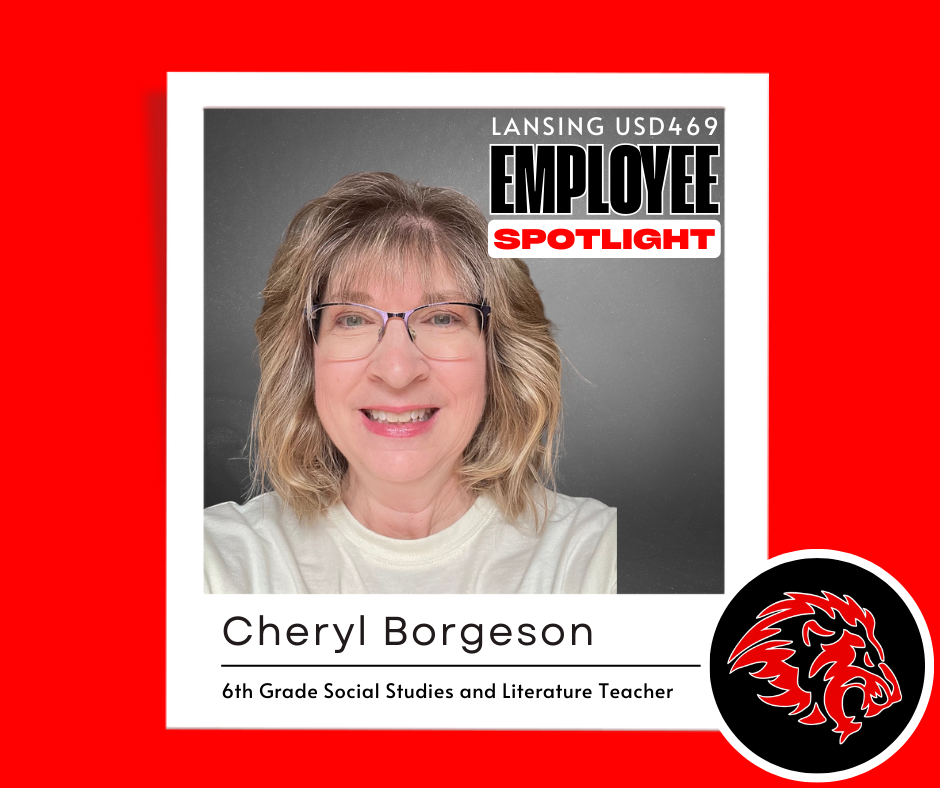Our "Employee Spotlight" series aims to showcase the unique personalities, talents, and stories that contribute to the success of Lansing USD469. This section celebrates the incredible individuals who make our Lansing USD469 community thrive.
Cheryl Borgeson, 6th Grade Social Studies and Literature Teacher
Question: How long have you worked in Lansing USD469?
Answer: Starting my 5th year teaching.
Question: Can you tell us a bit about yourself and the role you have within the school district?
Answer: I spent seven years as a paraeducator at Lansing Middle School before transitioning into a teaching role. This is now my fifth year teaching 6th grade Social Studies (Ancient Civilizations) and Literature. Additionally, I’m entering my second year as a member of our building’s BIST Vision Team. Teaching history from thousands of years ago presents unique challenges—students often question the relevance of ancient civilizations to their modern lives. I enjoy meeting that challenge by designing engaging, hands-on experiences that bring history to life. Throughout the year, my students participate in mock trials, re-enactments, dramatic performances, escape rooms, and simulation games. It’s incredibly rewarding to see their enthusiasm and excitement as they connect with the content in meaningful and memorable ways.
Question: What do you enjoy most about your role and the work you do in the school district?
Answer: Being a member of the BIST Vision Team has been an incredibly rewarding experience. As a teacher, one of the challenges is managing behaviors that can interfere with teaching and learning. It’s fulfilling to be part of a team that actively works to improve student behavior, creating a more supportive and productive learning environment for both students and teachers.
I also truly enjoy teaching 6th graders. They’re entering a new building, taking on increased responsibilities, and learning to meet higher expectations. I find great satisfaction in helping them navigate this transition—supporting them as they develop the skills they need to succeed in middle school and beyond.
In my classroom, I strive not only to teach academic content but also to help students build motivation and resilience. Throughout the year, I incorporate mini-lessons focused on personal growth and future readiness. We begin the year by exploring themes like "Finding Your Why" and the mindset of "Fail Early, Fail Often, Fail Forward." Later, we dive into lessons such as "10 Ways to Change the World," and I emphasize to each student that they have purpose, worth, and value.
Question: When you're not working, what hobbies or activities do you enjoy?
Answer: When I’m not in the classroom, I enjoy exploring antique malls in search of hidden treasures—particularly Depression-era glass, which has become a favorite collecting hobby of mine. I also love spending time with my family, reading, and watching movies. During baseball season, you’ll often find me cheering on the Monarchs at their games.
Question: Could you share a particularly heartwarming or memorable experience you've had while working with students or colleagues?
Answer: The last day of school is always a deeply heartwarming experience. Saying goodbye to students I've built meaningful relationships with over the past ten months can be emotional. As they leave my classroom, I can only hope I’ve done my part to help prepare them for future success and to encourage them to reach their full potential. Moments like students hugging me through their tears—or telling me, "Mrs. Borgeson, I used to hate social studies... now I don’t"—are powerful reminders of why I love what I do.
Question: What piece of advice would you like to offer to students to help them succeed and make the most of their educational journey?
Answer: I have several pieces of advice I always hope to share with my students. First, it’s okay to make mistakes or experience failure—as long as you reflect, learn, and grow from those experiences. Second, I want every student to know that they have worth, value, and something meaningful to contribute. Finally, I encourage them to discover their “why”—their purpose—so that their “what”—the things they choose to do—becomes more intentional, fulfilling, and impactful.

